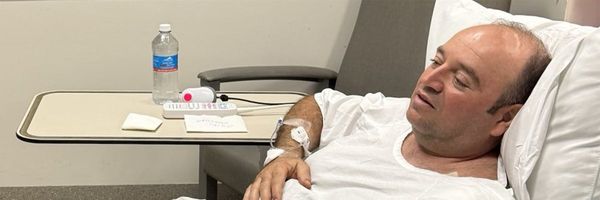Doctors at Apollo Hospitals here have performed a challenging carotid endarterectomy procedure on a 93-year-old man to remove the block in one of the carotid arteries that supply blood to the brain.
This block and multiple other blocks in all arteries supplying blood to his brain had put him at a high risk of developing a massive stroke any time. The surgery was done by administering regional anaesthesia with the patient remaining awake during the procedure.
The patient was increasingly becoming giddy and found it difficult to walk when COVID-19 was raging. Moreover, he had hypertension and bronchial asthma for years. The pandemic made it difficult for him to get immediate medical attention, the doctors said.
When he was brought to Apollo Hospitals, V. Balaji, senior vascular and endo vascular surgeon at the hospital, said the patient was found to have severe blocks in all the four main carotid and vertebral arteries that supplied blood to the brain. His brain was not getting even 10% of the blood supply it should get.
As removing the blocks from all the arteries was not possible, he said the right carotid artery that had the maximum blockage of 99% was chosen for the procedure. Moreover, in the remote chance of any complications during the procedure, the damage to this artery would result in the least impact for the patient.
He said the procedure was done under regional anaesthesia as it enabled continuous monitoring of blood supply and functioning of the brain during the procedure. He said the speed and precision were crucial as blood flow in the particular carotid artery was stopped during the procedure.
“Our department has performed more than 700 such procedures in the last 20 years, specifically under regional anaesthesia as it reduced post-operative complications to a minimum. Our post operative success rate over the years has been more than 99%,” he said.
While the procedure cannot be done for a person who suffered a massive stroke, he said the surgery was, however, a boon for those having initial symptoms of a Transient Ischemic Stroke (TIA). He said that TIA, a condition in which blood supply to brain was briefly interrupted, could manifest as short episodes of difficulty in speaking, understanding speech, weakness in one side of the body or double vision.
He said that such symptoms, which often get automatically corrected quickly, should not be ignored as they were strong warning signs of a stroke that can happen in the near future. “A simple ultrasound can show if there are any problems in blood supply to the brain,” he said.
Congratulating Dr. Balaji and his team, Suneeta Reddy, managing director, Apollo Hospitals, said the surgery was an example of how right diagnosis at the right time could prevent stroke. “The most disheartening thing is that 90% of stroke patients failed to reach hospital within the golden hour,” she said and added that there was a need to create more awareness.







